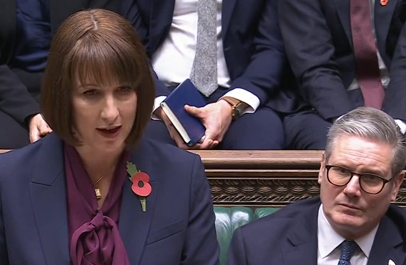Labour Chancellor Rachel Reeves first budget does not go far enough to tackle the challenges facing their service users, according to a raft of charities.
While commitments to increase funding for social care and affordable housing have been welcomed more action is needed, they say.
Among measures announced by Reeves is an extra £600m to local authorities to support social care, as part of a 3.2% “real terms increase in core local government spending power”.
In addition, the core schools’ budget will be increased by £2.3bn and there will be £1bn extra for special educational needs and disabilities (SEND) support.
However, the Children’s Charities Coalition, which includes Action for Children, Barnardo’s, the National Children’s Bureau, NSPCC and The Children’s Society, warned that such measures were “tweaks rather than the systemic change that is needed”.
“It is disappointing that the government has not taken this opportunity to invest more strategically in services for children,” they warn in a statement.
"Piecemeal, sticking plaster approaches to funding have got us to the crisis point we now find ourselves in.”
Other measures announced by Reeves in the budget, which was the first to be delivered by a female Chancellor, including raising the minimum wage to £12.21 an hour and giving the minimum wage of 18–20-year-old workers a 16.3% uplift to £10 an hour.
The carer’s allowance earning limit will also be raised, but disability charity United Response is concerned that Reeves budget continues “the rhetoric around tightening work capability assessments alongside a crackdown on fraud.”
Her budget details that the government will overhaul health and disability benefits early next year “to ensure the system supports people who can work to remain in or start work, in a way that is fair and sustainable”.
'Negative framing'
United response warns: "The negative framing on welfare continues to inflict stigma and increase the worry for people with a learning disability who are left feeling let down that the focus is on saving money over supporting disabled people.
"The thought of making cuts to the most vulnerable people and forcing people into work who are not capable of work, is not merely unjust, it is inhumane,” said Ben, who is supported by the charity.
“If schemes are introduced nationwide to support people back into work, they need to operate in a caring way, which sees if a person is capable of doing some specific and limited work which does not affect their benefits.”
Reeves’ Budget also reiterated previously announced plans to only hand out older people’s winter fuel payments to those on benefits or receiving Pension Credit. This move aims to save £1.5bn a year.
Independent Age chief executive Joanna Elson said: “Many older people living on low incomes will be incredibly concerned that the UK Government is going full steam ahead with plans to means test the Winter Fuel Payment.
"At the very least, this change shouldn’t be made until Pension Credit take-up is substantially increased.
“The latest figures show that up to 970,000 eligible older people could be missing out on Pension Credit, and now they will lose the Winter Fuel Payment despite living on a low income.
“This will have a devastating impact on older people in financial hardship across the country.”
Social investment
A potential surge in demand from the budget from those impacted by the announcements comes as charities face increased employer’s national insurance contributions and a rise in the national living wage.
Charity leaders have warned that this could lead to staffing and services cuts in the sector.
To support the sector Reeves has announced that work will begin to develop a ‘social impact investment vehicle. Further details will be announced in the next Spending Review.
This social investment announcement aims “bring together socially motivated investors, the voluntary sector and government to tackle complex social problems,” said Reeves.
“This announcement is a hugely significant one,” said Robin Hindle Fisher, chair of social investment funder Better Society Capital.
“We have seen through the growth of the social investment market the value that impact-aligned capital can provide to tackling complex social problems.
“At such a critical time for the UK. We stand ready to work with the Treasury and DCMS to ensure that impact capital fulfils its full potential in changing lives for those that need it.”
Latest News
-
MPs call on government to improve support for small charities
-
Burnout fears emerge for younger charity workers
-
Youth charity to adopt co-leadership model
-
Mahnoor Khan: Lessons from my first year in the charity sector
-
Charities should deploy AI ‘around real user needs’ not ‘internal assumptions’, says report
-
Improved NHS mental health support prompts charity’s closure
Charity Times video Q&A: In conversation with Hilda Hayo, CEO of Dementia UK
Charity Times editor, Lauren Weymouth, is joined by Dementia UK CEO, Hilda Hayo to discuss why the charity receives such high workplace satisfaction results, what a positive working culture looks like and the importance of lived experience among staff. The pair talk about challenges facing the charity, the impact felt by the pandemic and how it's striving to overcome obstacles and continue to be a highly impactful organisation for anybody affected by dementia.
Charity Times Awards 2023
Mitigating risk and reducing claims

The cost-of-living crisis is impacting charities in a number of ways, including the risks they take. Endsleigh Insurance’s* senior risk management consultant Scott Crichton joins Charity Times to discuss the ramifications of prioritising certain types of risk over others, the financial implications risk can have if not managed properly, and tips for charities to help manage those risks.
* Coming soon… Howden, the new name for Endsleigh.
* Coming soon… Howden, the new name for Endsleigh.
Better Society

© 2021 Perspective Publishing Privacy & Cookies














Recent Stories